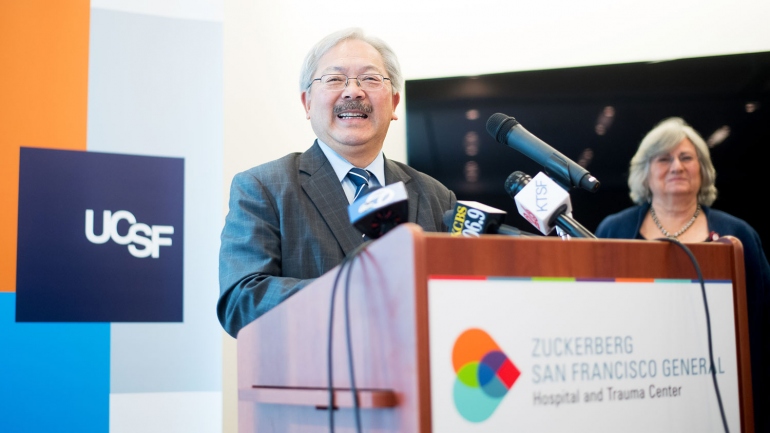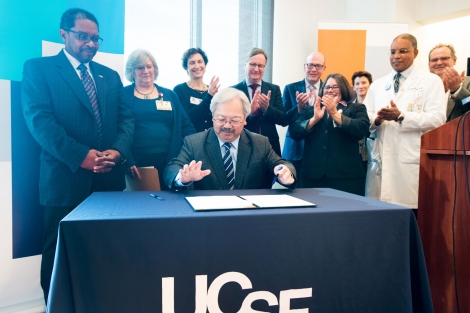UCSF at ZSFG Research and Academic Building (more information)
UCSF School of Medicine Space@UCSF
UCSF Community and Government Relations
“The roots of the remarkable progress in HIV medicine over the last three decades can be traced to the partnership between UCSF and ZSFG,” - Diane Havlir, MD

San Francisco Mayor Edwin M. Lee joined physicians, researchers and patients Monday for the signing of an ordinance that will allow UC San Francisco to proceed with construction of a new research and academic building at Zuckerberg San Francisco General Hospital and Trauma Center (ZSFG).
The planned $188 million building – to be paid for by UCSF at no cost to city taxpayers – will provide much-needed research space for more than 800 physician-scientists, trainees and staff who work at ZSFG and are currently dispersed among several old buildings on the campus.
The on-site presence of a robust research program is critical to maintaining top-quality patient care at ZSFG, one of the nation’s premier community hospitals. It’s one of the key factors in the hospital maintaining its designation as the City’s sole Level 1 Trauma Center, a rank reserved by the American College of Surgeons for the highest-quality, most comprehensive trauma treatment centers. ZSFG trauma specialists treat more than 4,000 patients with critical injuries each year. It’s also key for retaining and recruiting the world-class physicians who choose to work at ZSFG because of its public mission.
 UCSF and ZSFG leaders applaud as San Francisco Mayor Edwin M. Lee signs legislation for the new research building on Feb. 13. Photo by Noah Berger
UCSF and ZSFG leaders applaud as San Francisco Mayor Edwin M. Lee signs legislation for the new research building on Feb. 13. Photo by Noah Berger
Neil Powe, MD, MPH, MBA, vice chair of UCSF’s Department of Medicine, noted that UCSF research at ZSFG over the years has led to prevention and better treatments for the people of San Francisco, from HIV and tuberculosis, to diabetes and blood pressure. “We eradicate troubling health disparities that cut lives short and ruin human potential in this great city. Our research serves as a model for the nation and for the world, shining a light on San Francisco as a global health leader,” Powe said before the signing.
“We employ San Francisco residents, attract superstar physicians and train young people to make them competitive for the science and technology jobs of the future,” he added. “We can only do this if we have a modern and safe building where doctors who treat patients can perform research that helps their patients.”
Last month, the San Francisco Board of Supervisors unanimously approved the lease agreement for the building, the culmination of three years of negotiation between UCSF and the City.
Monday’s signing was a recommitment to public health in San Francisco and a testament to the unique, 150-year partnership in which UCSF faculty members provide all physician care at ZSFG while also teaching and conducting health research.
“We’ve talked about health care, we’ve talked about research, but this is really for our community here in San Francisco,” said Chancellor Sam Hawgood, MBBS. “I think the partnership that we have enjoyed for 150 years – and will enjoy for many, many years into the future – reflects the innovative spirit of our city and our region here in San Francisco.”
The new building will replace current facilities that UCSF faculty and staff must vacate in the coming years to meet University of California (UC) seismic standards. The development complements the voter-approved bond measures and philanthropic contributions totaling more than $1 billion for the new ZSFG hospital and soon-to-be renovated Ambulatory Care Center.
“Why not have a relationship that lasts another 150 years? This is such a wonderful partnership,” Mayor Lee said. “It has everything to do with having a world-class hospital and world-class research combined, together. Patients feel that.”
